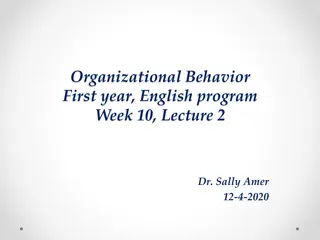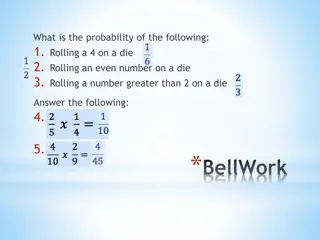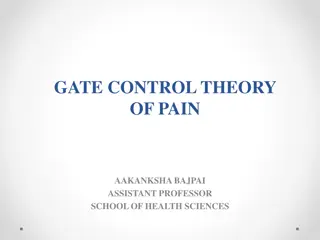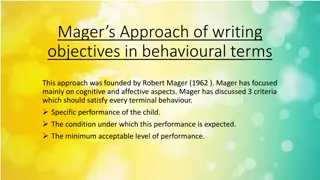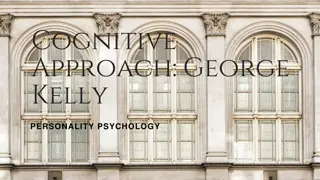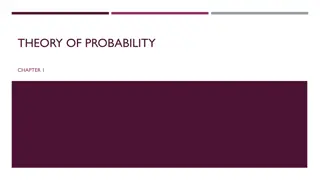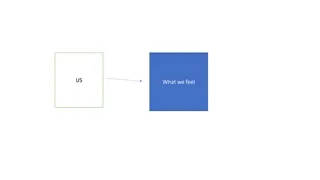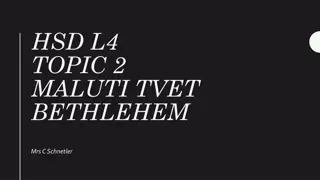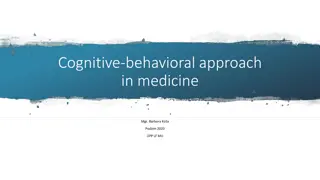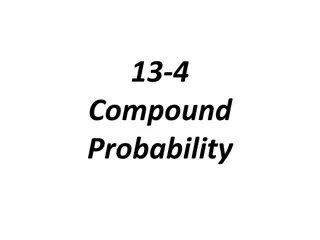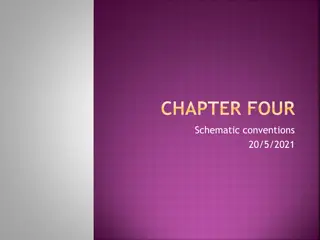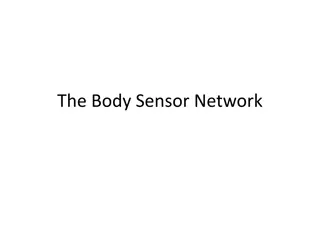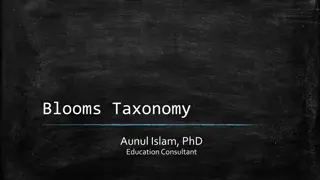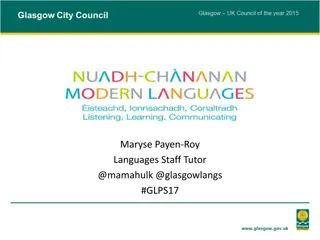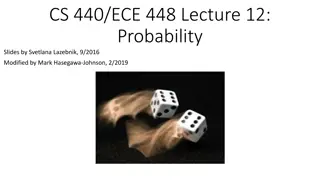Ginzburg Landau phenomenological Theory
The Ginzburg-Landau phenomenological theory explains superconductivity and superfluidity as distinct thermodynamic phases. It focuses on phase transitions characterized by singularities in specific heat at the transition temperature. Derived from BCS theory, it quantifies condensation energy, emphas
1 views • 38 slides
Crystal Field Theory in Transition Metal Complexes
Crystal Field Theory (CFT) explains the colors and magnetic properties of transition metal complexes. It focuses on the energy changes in d-orbitals of metal ions caused by surrounding ligands. This theory, developed in 1929, provides insights into the bonding interactions in complex compounds. The
10 views • 44 slides
Understanding Attitudes and Job Satisfaction
Attitudes play a crucial role in shaping our feelings towards objects, people, or events, influencing our behavior and job satisfaction. Components of attitudes include behavioral, cognitive, and affective aspects. Cognitive dissonance arises from conflicting attitudes or behavior. Major job attitud
1 views • 17 slides
Understanding Social Learning Theory and the Power of Example
Social Learning Theory, introduced by Bandura, emphasizes learning through observation and modeling. It explores how individuals acquire behavioral dispositions, trial-and-error experiences, and the impact of stimuli in the environment. The theory focuses on the importance of attention, retention, a
1 views • 17 slides
Evolution of Mathematical Theories and Proof Systems
Development of mathematical theories such as model theory, proof theory, set theory, recursion theory, and computational complexity is discussed, starting from historical perspectives with Dedekind and Peano to Godel's theorems, recursion theory's golden age in the 1930s, and advancements in proof t
1 views • 29 slides
Introduction to Organizational Behavior: Management Theories and Practices
Explore the evolution of organizational behavior from early management theories to contemporary practices. Understand the historical foundations and relevance of management theory in shaping workplace dynamics. Delve into key concepts like Scientific Management, Administrative Management, Bureaucrat
1 views • 28 slides
Understanding Emotional Labor in Organizational Behavior
Emotional labor involves employees expressing organizationally desired emotions during work interactions, impacting job performance. Employees may face emotional dissonance when projecting one emotion while feeling another, leading to surface or deep acting. Affective Events Theory (AET) suggests th
0 views • 19 slides
Understanding Probability in Events
Explore concepts of probability in various events like rolling a die, compound events, simple events, and spinner probability. Learn how to calculate probabilities of different outcomes and understand the difference between single and compound events. Discover key principles in probability theory an
0 views • 13 slides
Theories on the Origin of State: Divine, Force, Patriarchal, and More
Various theories such as Divine Origin, Force Theory, Patriarchal Theory, and others explain the origin of the state. Divine theories attribute state creation to God, while Force Theory emphasizes the strong subjugating the weak to establish authority. Each theory offers unique perspectives on the h
1 views • 24 slides
Understanding Forgetting: Theories and Influence on Memory Recall
Forgetting is a complex phenomenon influenced by theories such as Decay Theory, Interference Theory, and Motivated Forgetting. The Ebbinghaus forgetting curve highlights how memories fade over time. Decay Theory suggests memories decay over time, while Interference Theory explains how old and new me
0 views • 25 slides
Psychological Theories of Criminality: Understanding the Roots
Psychological theories of criminality delve into the association between intelligence, personality, learning, and criminal behavior. Major theories include Psychodynamic Theory by Freud, Behavioral Theory by Bandura, and Cognitive Theory by Kohlberg. These theories explore how unconscious mental pro
1 views • 20 slides
Austin's Theory of Law by Rinkey Sharma: An Overview
Austin's Theory of Law, presented by Rinkey Sharma, delves into the Imperative Theory of Law as proposed by Austin, known as the father of English jurisprudence. It explores General and Particular Jurisprudence, Austin's definition of law, and the elements of positive law, emphasizing the concepts o
0 views • 11 slides
Theories of International Relations Overview
The field of International Relations (IR) encompasses various theories that seek to explain global phenomena, drawing from disciplines like history, philosophy, and economics. Theory, derived from contemplation and speculation, organizes ideas to explain issues such as state emergence, conflict caus
1 views • 47 slides
Understanding the Gate Control Theory of Pain in Pain Management
This detailed content delves into the Gate Control Theory of Pain, explaining pain pathways involving nociceptors, A-delta fibers, and C fibers. It further explores central pain pathways like the spinothalamic tract, spinomesencephalic tract, and spinoreticular tract. The theory's mechanism of pain
3 views • 11 slides
Understanding the Theory of Firms: Neoclassical vs. Modern Approaches
The theory of firms is explored through the Neoclassical and Modern perspectives. Neoclassical theory focuses on profit maximization, while Modern theory delves into managerial, principal-agent, and transaction cost theories. The discussion covers criticisms of Neoclassical theory and the essential
1 views • 79 slides
Effective Strategies for Writing Behavioral Objectives in Education
Learn about Robert Mager's approach to writing objectives in behavioral terms, focusing on cognitive and affective aspects. Discover the criteria for defining terminal behaviors, explore action verbs for cognitive and affective objectives, and delve into impulsion, manipulation, co-ordination, natur
0 views • 6 slides
Understanding George Kelly's Personal Construct Theory in Personality Psychology
George Kelly's Personal Construct Theory explains how individuals perceive and organize their world by formulating and testing hypotheses, just like scientists. These personal constructs shape our unique views of events, influencing how we interpret reality and make decisions. Kelly's theory of cons
0 views • 23 slides
Theories of Causation in Psychological and Social Sciences
Overview of theories of causation categorized into psychological, social psychological, and sociological perspectives. Psychological theories focus on instinctive, biological, and psychological qualities of abusers, including Attachment Theory, Psychodynamic Theory, Social Learning Theory, and Situa
0 views • 15 slides
Understanding Political Theory through a Contextual Approach
Exploring G.H. Sabine's perspective on political theory through a contextual approach, emphasizing the importance of historical context and societal influences. Sabine argues that while political theory evolves with its contemporary politics, it should be analyzed within its specific time and social
0 views • 9 slides
Evolution of Light Theory: From Wave Theory to Quantum Theory
At the turn of the century, the discovery of the photoelectric effect challenged the wave theory of light, leading to the development of the quantum theory by Max Planck and Albert Einstein. This new theory introduced the concept of discrete energy units known as quanta, bridging the gap between wav
1 views • 62 slides
Understanding Probability Theory: Basics and Applications
Probability theory is a branch of mathematics that deals with the likelihood of different outcomes in random phenomena. It involves concepts such as sample space, probability distributions, and random variables to determine the chance of events occurring. The theory utilizes theoretical and experime
0 views • 11 slides
Dp-branes, NS5-branes, U-duality, and M-Theory Overview
Overview of Dp-branes, NS5-branes, and U-duality derived from nonabelian (2,0) theory with Lie 3-algebra. Introduction to M-theory, including M2-branes and M5-branes in the strong coupling limit. Discussion on BLG theory, Lorentzian Lie 3-algebra, and the ABJM theory for M2-branes.
1 views • 32 slides
Exploring Affect Theory in Modern Society
Affect theory delves into the complexities of emotions and their expression in contemporary society, shedding light on the impacts of modern life on individuals. Through a lens of nonlinguistic forces, it examines the dynamics of power, culture, and social interactions, offering insights into the nu
2 views • 8 slides
Understanding Time-Independent Perturbation Theory in Quantum Mechanics
Perturbation theory is a powerful tool in solving complex physical and mathematical problems approximately by adjusting solutions from a related problem with known solutions. This theory allows for more accurate approximate solutions by treating the difference as a small perturbation. An example inv
0 views • 19 slides
Ethical Theories: Divine Command vs. Virtue Theory Explained
Divine Command Theory asserts that morality is derived from God's commands, contrasting with Virtue Theory which focuses on developing moral virtues to achieve human flourishing and excellence. Divine Command Theory relies on religious texts, while Virtue Theory emphasizes the cultivation of virtues
0 views • 24 slides
Understanding Socio-Affective Development in Infants and Children
Socio-affective development focuses on how individuals interact with others and manage their emotions. It is influenced by factors such as personalities, morality, emotions, and spirituality. Attachment theory, proposed by John Bowlby, explains how infants form relationships with caregivers, startin
0 views • 16 slides
Understanding Fermi Liquid Theory in Interacting Fermion Systems
Fermi liquid theory, also known as Landau-Fermi liquid theory, is a theoretical model that describes the normal state of metals at low temperatures. Introduced by Landau and further developed by Abrikosov and Khalatnikov, this theory explains the similarities and differences between interacting ferm
0 views • 23 slides
Understanding Cognitive Behavioral Approach in Medicine: A Heuristic Perspective
Cognitive-behavioral approach in medicine, analyzed through affective heuristics and problem-solving heuristics, explores factors influencing decision-making processes and the dual processes theory. Key concepts include fast emotional reactions, reliance on emotion in judgment, reducing cognitive lo
0 views • 30 slides
Understanding Probability: Independent, Dependent, and Compound Events
Dive into the world of probability with a focus on independent, dependent, and compound events. Explore scenarios where events are interconnected or standalone, and learn how to calculate the probabilities of different outcomes. Discover the concepts of mutually exclusive and overlapping events thro
0 views • 9 slides
Computational Learning Theory: An Overview
Computational Learning Theory explores inductive learning algorithms that generate hypotheses from training sets, emphasizing the uncertainty of generalization. The theory introduces probabilities to measure correctness and certainty, addressing challenges in learning hidden concepts. Through exampl
0 views • 43 slides
Automata Theory and Theory of Computation Overview
This course overview covers concepts in automata theory and theory of computation, including formal language classes, grammars, recognizers, theorems in automata theory, decidability, and intractability of computational problems. The Chomsky hierarchy, interplay between computing components, modern-
0 views • 42 slides
Understanding Schema Theory: A Guide to Mental Representations
Schema theory in social science refers to the mental structures individuals use to organize knowledge and guide cognitive processes. This theory, prevalent in the 1980s, aids in interpreting and predicting the world by categorizing objects and events based on common elements. Schema theory in lingui
0 views • 20 slides
Theories of Interest in Microeconomics II
Explore various theories of interest in economics, including the Classical Theory, Liquidity Preference Theory by Keynes, Productivity Theory, Abstinence Theory, Time-Preference Theory, Fisher's Time Preference Theory, and the Loanable Fund Theory. These theories offer different perspectives on the
0 views • 6 slides
Exploring the Evolution of Atomic Theory
Delve into the historical journey of atomic theory starting from Democritus and Aristotle's views to modern advancements proving some aspects of Dalton's theory incorrect. Learn about key laws and theories such as the Particle Theory of Matter, Dalton's Atomic Theory, and JJ Thomson's discoveries, s
0 views • 30 slides
Noise Control Measures and Community Preferences at the Corn Exchange
Various images and references discuss the history of amplified music events at the Corn Exchange, noise complaints leading to control methods by the FTC, impacts on events and community preferences post-control, and survey findings on participant demographics, noise effects, and desired public event
0 views • 19 slides
Developing a Body Sensor Network Application for Identifying Affective Experiences and Craving for Alcohol
The project aims to develop an application that can identify affective experiences and physiological responses, particularly craving for alcohol. The application will differentiate between various mood states by collecting data which will be tested against a trained model. A system of survey schedul
0 views • 14 slides
Understanding Bloom's Taxonomy of Learning Domains
Bloom's Taxonomy, developed in 1956, focuses on promoting higher-order thinking in education. It categorizes learning into three domains: Cognitive (knowledge), Psychomotor (manual skills), and Affective (attitude). While Bloom's committee initially omitted the Psychomotor domain due to teaching lim
0 views • 19 slides
The Role of Play in Language Learning and the Critical Age Theory
The critical age theory suggests that young children have greater brain plasticity for language internalization, while adults can learn L2 faster due to developmental stages. Learning a second language early provides advantages in accent acquisition. Affective relationships and play are crucial in l
0 views • 15 slides
Macromechanical Analysis of Lamina and Tsai-Hill Failure Theory Overview
The Tsai-Hill failure theory is based on the strengths of a unidirectional lamina, incorporating longitudinal and transverse tensile and compressive strengths, as well as in-plane shear strength. This theory, derived from the distortion energy theory, provides criteria for determining lamina failure
0 views • 15 slides
Understanding Probability and Decision Making Under Uncertainty
Probability theory plays a crucial role in decision-making under uncertainty. This lecture delves into key concepts such as outcomes, events, joint probabilities, conditional independence, and utility theory. It explores how to make decisions based on probabilities and expected utility, highlighting
0 views • 34 slides






